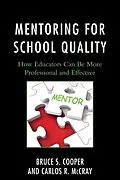Making Mentoring Work should help educators to mentor or to be mentored effectively in our schools. We all have had mentors, those key adults from family, work, or schools who have assisted us in learning and becoming good adults, skilled and able professionals, and contributing member of community and society. Although it's not easy, it does occur, is doable, and this book seeks to help everyone - educators, in particular -- both to be mentored and to be a mentor. In fact, the authors believe and show that everyone needs mentoring and many have the capacity, knowledge, and savvy to be a helpful mentor to others in their field, school, and world.
Autorentext
Bruce S. Cooper, Ph.D., is Professor Emeritus, Education Administration and Public Policy, Graduate School of Education, Fordham University; having taught at University of Pennsylvania and Dartmouth College, after receiving his doctorate at the University of Chicago with Donald A. Erickson, as his mentor. Cooper has written 35 books on education politics and policy, including The Handbook of Education Politics and Policy, in two editions with Lance D. Fusarelli and James Cibulka; served as President of the Politics of Education Association and a founding member of Private School Research Association; and received the Jay D. Scribner Award for Mentoring and the UCEA.
Zusammenfassung
Making Mentoring Work should help educators to mentor or to be mentored effectively in our schools. We all have had mentors, those key adults from family, work, or schools who have assisted us in learning and becoming good adults, skilled and able professionals, and contributing member of community and society. Although it's not easy, it does occur, is doable, and this book seeks to help everyone educators, in particular -- both to be mentored and to be a mentor. In fact, the authors believe and show that everyone needs mentoring and many have the capacity, knowledge, and savvy to be a helpful mentor to others in their field, school, and world.
Inhalt
Chapter 1: Building Professional Relationships by Mentoring, Bruce S. Cooper
Chapter 2: Mentoring for School Improvement, Laverne Nimmons
Chapter 3: Existential Leadership and Mentoring by Principals, Robert Riccuiti
Chapter 4: Climate Controller: Principals Creating Optimal Environment for Teacher
Development, Dagoberto Artiles
Chapter 5: The Key Components of Mentoring in School Leadership: Preparation Programs and Leadership Assignments, Tyrone Bynoe
Chapter 6: A Cultural Approach to Mentoring New Teachers, Donna Redman, Sharon Conley,&
Terry Deal
Chapter 7: Teacher Mentoring Practices and Models: What Can We Learn from Research and Effective Practices? Chun Zhang
Chapter 8: Mentoring College Students with Disabilities: Processes and Program, Carol &
Marshall Strax
Chapter 9: The Future of Mentoring: Strengthening Sustainability through a Humanistic Approach, Samuel Thomas Martin, Phyllis F. Reggio, & Carlos R. McCray
Index
